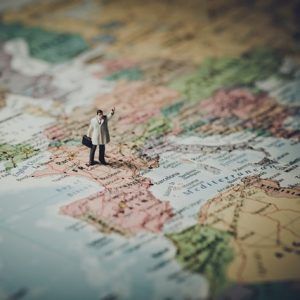The age of discovery was a time in world history when various powers competed to unlock new territories overseas. It was a time when previous segregation would be substituted with new connections, interactions and bonds. Europeans “won” the age of discovery, carving massive territories for themselves all around the world. However, there is ample evidence to suggest that other world powers participated in the adventures to find new territories.
A curious challenge to African historicity
European powers stand out in the age of discovery because they essentially wrote modern history. Details of European exploits and findings were well recorded, followed up on and developed. By building an ever-expanding library of findings, the discoveries of European explorers were better preserved.
In Africa, maintaining the historical record has been hindered by forgetfulness. Without the means of writing down events, we have always committed our history to memory. For example, in West Africa, griots memorised events and would sing about them to keep them in the collective remembrance of the community.
Relying on oral history exposed us to one fatal problem from which it’s incredibly hard to recover – forgetfulness. Unlike the written word, the spoken word is easily distorted, either intentionally or unintentionally.
Propagandised history of Africa
The age of discovery was, first and foremost, an age of searching for new wealth. Imperial European powers participated in exploration principally because they sought to expand their economies with new commodities and new markets. Exploration companies also played the role of prospecting, seeking to uncover new treasures to cover exploration costs.
Slavery
One important treasure discovered in Africa was the people of Africa themselves. Explorers were quick to repurpose their sailing vessels into slave ships, and they made every effort to find legitimacy for this trade. Reporting back to Europe about Africa, explorers had good motivations to fudge. Unfortunately, their lies would end up serving as the groundwork for subsequent attempts to write down African history.
With time, the enslavement of Africans abroad lost popular support. The drive towards abolishment started in the 18th century and continued to the 19th, with the church and imperial powers playing a key role. However, it was not the end of the exploitation of Africans or Africa.
Colonialism
Driven by colonialist ambitions, European powers now sought to settle the land. To receive popular support back home, a new sort of narrative had to be created. This time around, that it was in the best interests of the African to be colonised. To make this narrative stick, the colonists had to pick up the campaign of dehumanisation that the slavers had started. Lying about African history was a small part of it, but it was the most important. It made Africans easier to control.
The discussion on propagating African history cannot be complete without the inclusion of missionaries into the mix. Not even these supposed agents of truth and justice hesitated to lie, misrepresent, and whitewash African history.
The Adventures of Abu Bakr II
The age of discovery is widely believed to have been a Europeans-only affair. Every “real” historian must believe this, because “accepted evidence” says so. For more than 500 years, we have all believed that Columbus was the first outsider to reach America because we didn’t know better. The historical record proves it.
However, when you dig up a little bit of history, you start to find those alternative truths that have been suppressed. A good example of this is the adventures of King Abu Bakr II in the new world. Abu Bakr II was the 9th king of Mali. He reigned right before Mansa Musa, the man who would eventually become the richest in history.
Abu Bakr II started searching for new lands across the ocean in the early 14th century. This was nearly 200 years before Christopher Columbus made his first voyage in 1492. In his first expedition, Abu Bakr II sent a large fleet of specially-equipped ships and explorers with goods and supplies.
In the second leg of the exploration, Abu Bakr II himself led the expeditionary forces. He renounced his claim to the throne to his brother Musa, joining thousands of sailors on the untested route across the Atlantic. The only question today is: where did he end up?
There is evidence to support Abu Bakr II’s expedition. Christopher Columbus found stories of black people arriving in the Spanish regions. In fact, his third voyage was meant to investigate these claims of African expeditionary presence in the Americas centuries before he set off from Spain.
The library of African history
The age of discovery was an egotistical period in world history. European powers sought to outdo each other by any means, even when this meant lying and obfuscating the achievements of others. Abu Bakr II sailed across the Atlantic – that much is clear from oral record and archaeology. For example, golden-tipped spears from West Africa have been found in Brazil that predate Columbus in America.
It should not be a big surprise, therefore, that we don’t know such exploits as were conducted by Abu Bakr II. Having come from a legacy of slavery and colonialism, during which European powers made a concerted effort to erase Africans from history, it is to be expected. What we can do is refuse to believe in any more lies and fabrications.
The history of Africa needs a fresh retelling – this time by Africans themselves. By combining geomythology, linguistics, and archaeology, we can verify tales like Abu Bakar’s, record others, and create a comprehensive and accurate history about Africa.





